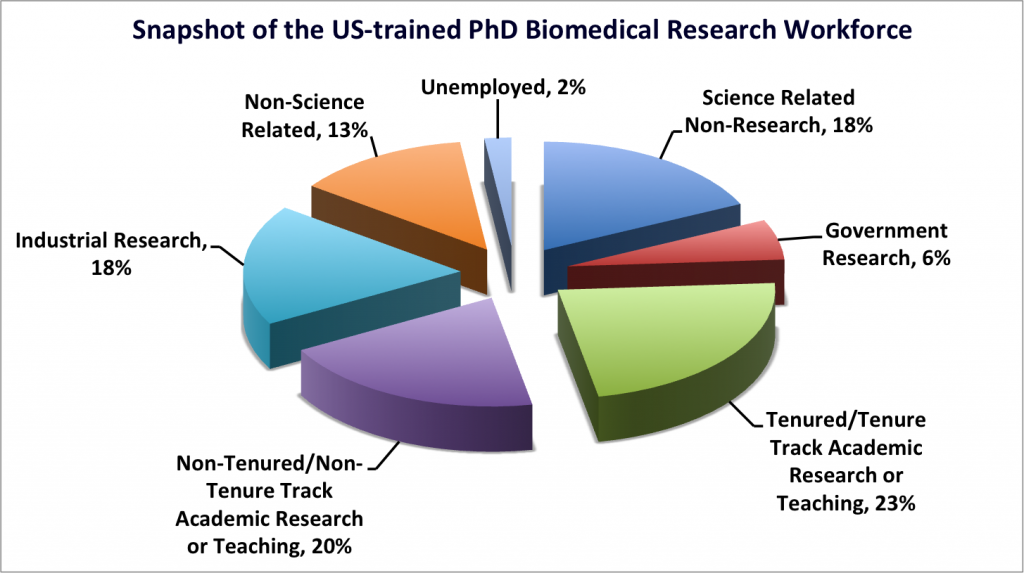RESOURCES
Why is this program being offered?
The BEST program was initiated by the National Institutes of Health (NIH) in 2013, by recommendation of the Biomedical Research Workforce Working Group. This group was assembled to assess the state of the biomedical workforce and make recommendations to the NIH regarding how many people we should be training, and for what types of jobs. Their report from 2012 recognizes the breadth of careers available to PhDs in the biomedical and health sciences, which are important for advancing the NIH’s mission of ultimately improving human health (see figure below). In fact, in 2009, approximately 75% of US-trained biomedical PhD’s were employed in categories other than tenured or tenure-track faculty positions, thus, it would be a misnomer to refer to these categories as “alternative careers”. Yet, the majority of today’s biomedical doctoral and postdoctoral training programs focus primarily on training students for academic research positions.
Currently 10 universities nationwide have received NIH BEST awards, with the mission of broadening the training experience to better expose trainees to the breadth of careers that comprise the biomedical workforce. Virginia Tech’s BEST program aims to foster an understanding of the career opportunities available to biomedical PhDs, and provide trainees with guidance and information toward preparing them for pursuit of these goals, through instruction, internships, and mentorship from a range of academic and non-academic professionals.
For more information about the NIH’s BEST program, please click here.
Career Resource Library
The BEST Program has developed a library of career resources on the Roanoke campus for doctoral students and postdocs in the biomedical and health sciences. Please contact Jay Read (jayread@vtc.vt.edu) to sign out any of these books (2 weeks maximum).
Barker, K. (2002). At the Helm: A Laboratory Navigator, Cold Spring Harbor Laboratory Press.
Basalla, S. and M. Debelius (2008). “So What Are You Going to Do with That?”: Finding Careers Outside Academia, University of Chicago Press.
Borbye, L. (2010). Secrets to Success in Industry Careers: Essential Skills for Science and Business, Elsevier Science.
Bush, P. M. C. (2012). Transforming Your STEM Career Through Leadership and Innovation: Inspiration and Strategies for Women, Elsevier Science.
Carter, M. (2012). Designing Science Presentations: A Visual Guide to Figures, Papers, Slides, Posters, and More, Elsevier Science.
Feibelman, P. J. (2011). A PhD is Not Enough!: A Guide to Survival in Science, Basic Books.
Gray, P. and D. E. Drew (2008). What They Didn’t Teach You in Graduate School: 199 Helpful Hints for Success in Your Academic Career, Stylus Pub.
Johnson, A. M. (2011). Charting a Course for a Successful Research Career: A Guide for Early Career Researchers, Elsevier B.V.
Johnson, A. M. and A. P. Johnson (2013). Improving Your Research Management: A Guide for Senior University Research Managers, Elsevier.
Margulis, A. R. (2010). The Road to Success: A Career Manual – How to Advance to the Top, Elsevier Science.
Olivero, O. (2013). Interdisciplinary Mentoring in Science: Strategies for Success, Elsevier Science.
Robbins-Roth, C. (2006). Alternative Careers in Science: Leaving the Ivory Tower (Second Edition). Burlington, Academic Press.
Where can I go for additional resources?
National Postdoctoral Association
VT websites:
*Materials from Advance VT Seminars and Workshops
